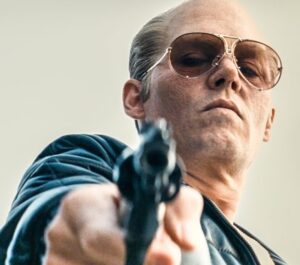Black Mass
Starring Johnny Depp, Joel Edgerton, Benedict Cumberbatch
There is no denying that Johnny Depp’s performance as James “Whitey” Bulger in “Black Mass” is his finest in years, a twisted tour-de-force of subtle, reserved psychopathy. A shame, then, that the movie around him is so uninventive in its structure. It’s not a bad film by any stretch of the imagination; it just spends too much time recounting events and not enough on the intriguing details.
While the story of Bulger has fascinated people across the nation, it’s obviously of particular interest to Massachusetts residents. The criminal’s infamous alliance with the FBI — and his subsequent ascendance to untouchable “crime lord” — happened in and around our state’s capital city, involving corruption of local law enforcement and murders in locations a bit too close to home. With Bulger’s capture in 2011 reigniting the fire of interest, it’s only natural that it would get the big-screen treatment, complete with an all-star cast: Joel Edgerton as FBI liaison John Connolly, Benedict Cumberbatch as Bulger’s brother William, and “Breaking Bad” alum Jesse Plemons as young recruit Kevin Weeks.
The actors deliver their Boston-accented lines with fluctuating authenticity. At times they might not sound out-of-place in Dorchester, at others they appear to be speaking through a mouthful of marbles. Either way, they are all too compelling to take lightly; while the phoniness of a few early lines elicited laughs from the audience, there was quickly silence.
Depp is invisible as an actor, cloaked by a thick layer of makeup and an unbelievable dedication to character; his Bulger is cold, seething, ready to explode at the first sign of betrayal. His scenes with violence are revealing, but those without even more so. A dinner conversation involves an associate revealing a “secret recipe” — to which Bulger responds with fury and suspicion.
“I’m just f—ing with you,” he says, after much too long. We’re not so sure. Less sure are we when he “checks up” on Connolly’s wife feigning illness to avoid eating with the mobsters, running his fingers through her hair and caressing her throat while fearful tears roll down her cheeks.
It’s these scenes, exploring the nitty-gritty emotions of Bulger and the rest of the Winter Hill Gang, that are the most fascinating. And there are a great deal of them, to be fair: those around the death of Bulger’s son; those around the childhood friendship of Connolly, Bulger and his politician brother; and those around Connolly and his wife, who is slowly realizing that her husband is getting in over his head. We want to see these individual stories develop, and we are still wanting when the credits roll.
Ultimately, there is too much material to fit the two-hour running time, and so director Scott Cooper chooses to give us summaries rather than stories. The framing device, which sees the present-day Winter Hill boys giving testimony to the FBI in close-up shots before cutting to flashbacks, is more “documentary dramatization” than film artistry. A tighter focus might have helped; major players come and go without much context, Connolly is missing for large sections of the film, and goofy epilogue text tells us “Rudy” style how these people went on to do some other things.
There is probably enough in the story of Bulger and the Winter Hill Gang for five movies. We can still wait for those to be made, but in the meantime, this is a damn good highlight reel.


